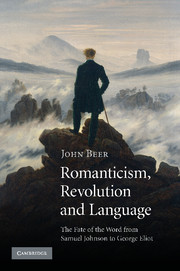Book contents
- Frontmatter
- Contents
- Preface and acknowledgments
- List of abbreviations
- 1 ‘Democracy’ in Somerset and beyond
- 2 Politics, sensibility and the quest for adequacy of language
- 3 The heart of Lyrical Ballads
- 4 The Prelude: a poem in process
- 5 Words or images? Blake's representation of history
- 6 Blake, Coleridge and ‘The Riddle of the World’
- 7 Challenges from the non-verbal and return to the Word
- 8 The Nature of Hazlitt's taste
- 9 Jane Austen's progress
- 10 Languages of memory and passion: Tennyson, Gaskell and the Brontës
- 11 George Eliot and the future of language
- Index
8 - The Nature of Hazlitt's taste
Published online by Cambridge University Press: 04 August 2010
- Frontmatter
- Contents
- Preface and acknowledgments
- List of abbreviations
- 1 ‘Democracy’ in Somerset and beyond
- 2 Politics, sensibility and the quest for adequacy of language
- 3 The heart of Lyrical Ballads
- 4 The Prelude: a poem in process
- 5 Words or images? Blake's representation of history
- 6 Blake, Coleridge and ‘The Riddle of the World’
- 7 Challenges from the non-verbal and return to the Word
- 8 The Nature of Hazlitt's taste
- 9 Jane Austen's progress
- 10 Languages of memory and passion: Tennyson, Gaskell and the Brontës
- 11 George Eliot and the future of language
- Index
Summary
After the years of uncertainty surrounding the struggle for superiority between England and France, the élan produced by final victory at Waterloo was accompanied by restlessness. It was not easy to see how development might now take place: one could not think of returning to the status quo ante; there was no obvious way forward. Yet younger writers were encouraged by the emergence of new voices: Keats expressed his feelings in a poem of 1816 beginning ‘Great spirits now on earth are sojourning …’ – the spirits he had in mind being Wordsworth, Leigh Hunt and Benjamin Haydon; while one of the most striking statements of the time is in his letter to the last-named of January 1818 that concluded, ‘every day older I get – the greater is my idea of your atchievements in Art: and I am convinced that there are three things to rejoice at in this Age – The Excursion Your Pictures and Hazlitt's depth of Taste’.
To think of someone finding Hazlitt's ‘depth of taste’ a cause for rejoicing is strange, to say the least – not to mention Keats's linking of it with Wordsworth's Excursion and Haydon's own pictures. Some light has been thrown on the matter, however, by David Bromwich, who pointed out that Hazlitt had in fact written one of the most interesting critiques of Wordsworth's poem at the time, and that in order to appreciate it fully one should turn, not to the version in his Round Table collection but to the original review as it appeared in The Examiner between August and October 1814.
- Type
- Chapter
- Information
- Romanticism, Revolution and LanguageThe Fate of the Word from Samuel Johnson to George Eliot, pp. 132 - 155Publisher: Cambridge University PressPrint publication year: 2009



